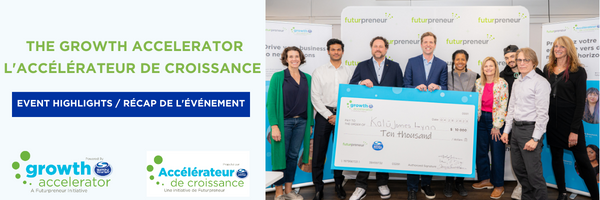- Futurpreneur(s) and partners
Afterthoughts from the G20 YEA: Scaling Up Your Business
Written by: Cindy Goertzen, Co-Founder & COO Trivenity Corporation, Co-Founder & President, Maira Group Inc.
In September 2016, I attended the G20 Youth Entrepreneurs’ Alliance (G20 YEA) Summit in Beijing, China. As Sherpa for the Canadian delegation, I had the distinct pleasure of supporting more than two dozen Canadian young entrepreneurs while they interacted with their global counterparts discussing the theme of “Disruptive Innovation. Smart Entrepreneurship.”
One of my newest businesses provides corporate development and corporate finance services to entrepreneurs and we love entrepreneurs who have a growth mindset and a willingness to scale up. While not every business is scalable, there are many entrepreneurs who have successfully scaled up their businesses, some with the help of government programs and others with the help of their investors. At the Summit, I found myself asking; what if there was an ecosystem created between public, private and non-profits with sole purpose of supporting businesses to scale up? Could such an ecosystem actually be agreed upon between these three and what help could they actually provide?
In 2016, the Organization for Economic Co-operation and Development (OECD) published a report titled Financing SMEs and Entrepreneurs 2016: An OECD Scoreboard. When scaling-up, SMEs need capital. In their report the OECD published data from 2000 to 2014 showing debt financing to large Canadian businesses has grown while debt financing to small businesses remained flat. The report went on to share the Government of Canada’s policies in 2014-15 listing many programs that have been made available to SMEs and large firms. The question now is will these policies affect change? Will SMEs be more inclined to scale-up and will it be reflected in the debt financing numbers ten years from now? For now, it is too early to tell.
I am often asked if there is government financing available for my business. My answer is yes, with conditions. I go on to explain you will need to identify the program that fits your needs and make sure your business meets the requirements of the specific program. Finally, you must be willing compile and write comprehensive reports that often requires hours of your time. This last part is usually not initially factored in by the SMEs at the time of their application and they are shocked at how much detail they need to provide in their reports. Although this model may have worked for many years, with all the disruption occurring in business around the world it maybe it time we look at a new model.
In my research to determine if I was alone in my idea to help SMEs scale-up within an ecosystem, I was excited to read a report published in November 2014 by Deloitte UK titled The Scale-up Challenge. It discussed that by identifying high growth firms then providing them with support and using role models they believe it will eventually lead to an increase in scale-ups. I found it interesting that face-to-face mentoring was identified as one of the three most important drivers of success in the long term. The other two factors were holistic coordination and talent of the entrepreneur.
Futurpreneur Canada has one of the most successful mentoring programs I am aware of, with over 3,000 mentors across Canada. They are a not-for-profit organization that helps young entrepreneurs become successful business leaders through mentorship, learning resources and start-up financing. When a young entrepreneur receives start-up financing, they are automatically paired with a mentor to increase their chances of success.
If mentoring is a driver of success when it comes to scale up and entities like Futurpreneur Canada have implemented it as part of their financing requirements, perhaps all governments need to start building in face-to-face mentoring as part of their debt financing programs. This is one step on the road to creating an ecosystem.





